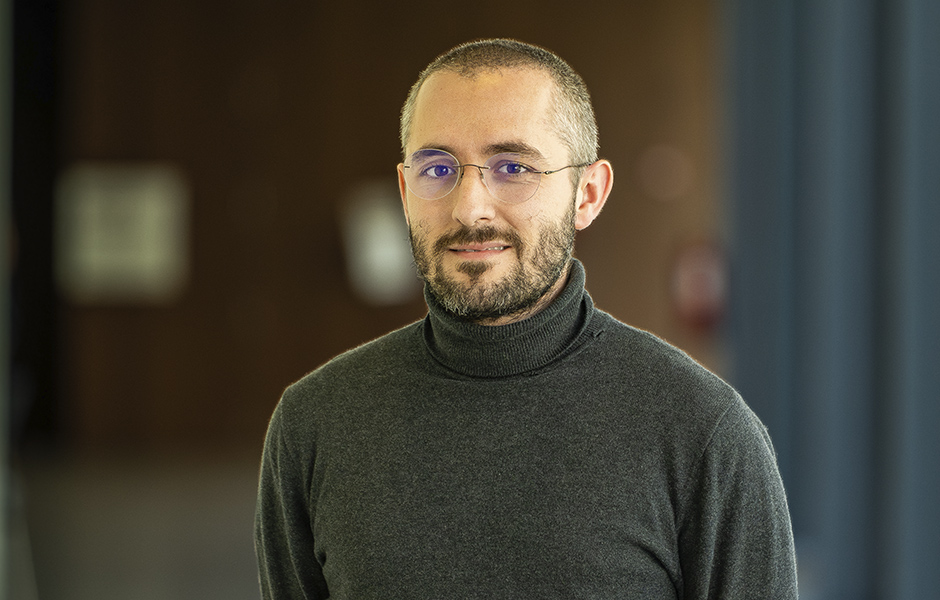Tiago Taveira Gomes was born in Porto 35 years ago. He is an integrated researcher at CINTESIS – Center for Health Technology and Services Research, in the AI4Health – Artificial Intelligence in Health group, at the TL3 – Health Data & Decision Sciences & Information Technologies, as well as a professor at the Faculty of Medicine of the University of Porto (FMUP) and at Fernando Pessoa University. He sees himself above all as “a person of processes and efficiency”. He is seen as a pioneer in the development of software in Health, using artificial intelligence.
Life led him to Medicine, following his parents’ example. He entered FMUP in 2006 with the idea of studying Plastic Surgery, but his destiny was not in the operating room. In his fifth year, he turned to Psychiatry. It was in the first year of the common internship that he decided on General and Family Medicine, where, in addition to the clinical and mental health component, he could explore the “more technical” component of measuring quality and health indicators.
Taking up software as “a parallel passion”, he recounts an episode that ended up being decisive in his path. He was in the third year of his degree when he was challenged to create a website for Yes Meeting. “I was studying Pathological Anatomy and learning to program because I had committed. When I realized the potential of software engineering, my life changed completely,” he explains.
He confesses that he was often challenged to leave medicine and devote himself solely to software, but his family insisted that he finish his degree, which he did in 2012. “That was very important. I know the problems first hand,” he acknowledges.
He worked at ALERT Life Sciences Computing, a company dedicated to developing clinical software. In 2015, he helped found MTG Research & Development Lab, a scientific consultancy company, at the same time as his internship at USF do Covelo/ACES Porto Oriental. He left the National Health Service to dedicate himself to FMUP and the projects in the company he founded.
In 2016, he received his doctorate from FMUP. His CV also includes projects for the Ministry of Health and collaborations with the Central Administration of the Health System (ACSS) and the Northern Regional Health Administration (ARS-Norte).
In 2018/2019, he joined CINTESIS by invitation, after completing his master’s degree in Information Engineering at the Faculty of Engineering of the University of Porto (FEUP), in which he had Pedro Pereira Rodrigues, coordinator of the group to which he belongs, as an examiner.
“I’ve always seen healthcare as a huge opportunity to improve processes. Research was the way I was able to produce solutions. I’m not a born researcher, but a doctor who uses research as a tool for a purpose,” he says.
Currently, his lines of research are focused on creating robust tools and generating real-world evidence, with the aim of using the electronic clinical records produced in health institutions for statistical purposes, following “a path of technological innovation aligned with the vision of the European Health Data Space”, in order to process information where it exists.
The European study on heart failure published in 2023 in the British Medical Journal, in collaboration with several countries, is “a good example of how this new approach can be used to characterize populations, rather than using samples, safely, in order to improve the quality of healthcare, especially in priority areas where there is still a lot of work to be done.”
For the future, he advocates greater exchange between the various players. “There are hybrid areas that are conducive to collaboration between academia, industry, private companies, NHS institutions, regulators and the different players. We are also trying to bring in partners from the social sector, such as the IPSS, which could directly benefit from many initiatives aimed at improving the care of the most vulnerable,” he says.
What is your 1-Year Ambition?
I have several projects underway, namely on potentially avoidable emergency room visits, domestic violence, heart failure, obesity, diabetes, respiratory diseases, and oncological diseases, in partnership with FMUP and the NHS institutions across the country. I hope to have the first multicenter federated studies with Portuguese institutions in 2024. Another goal is to establish bridges for federated studies, especially with Nordic countries.
What is your 10-Year Ambition?
In the mid-term, my aim is for the work I’ve been doing to serve as a basis for both higher education and health institutions to establish a culture and competence capable of developing this type of activity autonomously, and for it to be central to the management and analysis of care provision and innovation. I would like to see hundreds of fellow health and technical professionals carrying out projects based on the example we are setting. I hope it’s something that transcends us.
How is Life Beyond Teaching and Research?
I enjoy spending time with my family (wife, two children, siblings and grandparents).

